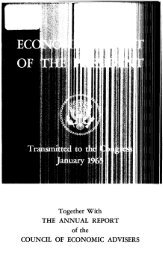Economic Report of the President
Report - The American Presidency Project
Report - The American Presidency Project
- No tags were found...
You also want an ePaper? Increase the reach of your titles
YUMPU automatically turns print PDFs into web optimized ePapers that Google loves.
<strong>of</strong> lenders that some debtors will not be able to achieve <strong>the</strong> requiredadjustment is precisely what makes <strong>the</strong>m reluctant to lend.Fortunately, a serious financial disruption is unlikely. The debtorcountries and <strong>the</strong> banks which are <strong>the</strong>ir major creditors share astrong interest in an orderly resolution <strong>of</strong> <strong>the</strong> debt problem. For <strong>the</strong>debtor countries, maintaining good financial standing is essential if<strong>the</strong>y are to maintain access both to world capital markets and to <strong>the</strong>irexport markets. At <strong>the</strong> same time, banks realize that demanding toorapid a repayment from debtor countries could prove counterproductive,and <strong>the</strong>y are probably willing to provide enough financing sothat debtor countries can more easily handle <strong>the</strong> financial squeeze. Althoughbanks find <strong>the</strong>mselves in somewhat <strong>of</strong> a "prisoner's dilemma"situation, in which no one bank will want to lend if it believes that<strong>the</strong> loans will only go to repay o<strong>the</strong>r banks, this problem should notprove insoluble. The banking community should be able to work with<strong>the</strong> International Monetary Fund (IMF) in negotiating agreementswhich balance an adequate degree <strong>of</strong> new lending to <strong>the</strong> debtorcountries with realistic economic adjustment plans. To aid in thisprocess, <strong>the</strong> Administration and representatives <strong>of</strong> o<strong>the</strong>r industrialnations recently agreed in principle to an enlargement <strong>of</strong> <strong>the</strong> IMF'sresources.Perhaps <strong>the</strong> most important safeguard against a financial crisis is<strong>the</strong> ability <strong>of</strong> <strong>the</strong> governments and central banks <strong>of</strong> <strong>the</strong> majorindustrial countries to provide a safety net for <strong>the</strong> international financialsystem. Central banks act as lenders <strong>of</strong> last resort for commercialbanks, providing effective protection against banking panics. At <strong>the</strong>same time, industrial country governments have demonstrated <strong>the</strong>irwillingness to help provide temporary financing for developing countriesin order to bridge <strong>the</strong> interval until agreements can be reachedwith <strong>the</strong> IMF. (The IMF recently concluded agreements with Mexico,Argentina, and Brazil.)Effects on World TradeAlthough a serious disruption <strong>of</strong> <strong>the</strong> international financial systemis unlikely, for all <strong>of</strong> <strong>the</strong> reasons cited, serious problems still exist.Even under optimistic assumptions, those developing countries withhigh ratios <strong>of</strong> debt to exports will be forced to improve <strong>the</strong>ir tradebalances substantially in order to pay <strong>the</strong> interest on <strong>the</strong>ir debt.Much <strong>of</strong> this trade balance improvement will probably come throughreductions in imports, involving painful reductions in output and realwages in <strong>the</strong> debtor countries. This will also depress demand for <strong>the</strong>products <strong>of</strong> industrial countries—particularly <strong>the</strong> United States,which has especially close trading relations with some <strong>of</strong> <strong>the</strong> majorLatin American debtors. The debt problem <strong>of</strong> <strong>the</strong> developing countriesmay worsen <strong>the</strong> U.S. trade balance by $10 to $20 billion and75
















